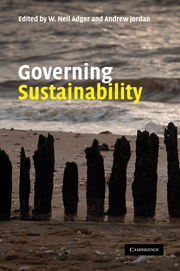Book contents
- Frontmatter
- Contents
- List of figures
- List of tables
- List of contributors
- List of abbreviations
- Foreword by Jonathon Porritt CBE
- Preface
- Part I Overview and Context
- Part II Governance and Government
- Part III Governance and Civil Society
- 6 Citizens, citizenship and governance for sustainability
- 7 The governance of science for sustainability
- 8 Practitioner evaluations of participatory processes in environmental decision making
- Part IV Governance and Decision Making
- Part V Conclusions
- Index
- References
6 - Citizens, citizenship and governance for sustainability
Published online by Cambridge University Press: 05 June 2012
- Frontmatter
- Contents
- List of figures
- List of tables
- List of contributors
- List of abbreviations
- Foreword by Jonathon Porritt CBE
- Preface
- Part I Overview and Context
- Part II Governance and Government
- Part III Governance and Civil Society
- 6 Citizens, citizenship and governance for sustainability
- 7 The governance of science for sustainability
- 8 Practitioner evaluations of participatory processes in environmental decision making
- Part IV Governance and Decision Making
- Part V Conclusions
- Index
- References
Summary
Introduction
This chapter contributes to the current debate regarding environmental attitudes and behaviour, and how to change them by employing systems of governance. It is also, I believe, a contribution to citizenship theory and practice, in that my enquiry into environmental attitudes and behaviour leads me to develop a notion of ecological citizenship which I take to differ in significant ways from the citizenship traditions which history has bequeathed us. Finally, to the extent that citizenship can be sensibly talked of as a potential governance tool for achieving sustainability, my argument bears directly on the two main themes of this book: governance and sustainability. Any move to enlist citizenship for the policy toolbox looks like a move towards governance rather than government – i.e. society self-steering rather than being steered by some hierarchically superior body – and I shall come back to this toward the end of the chapter.
As far as changing environmental attitudes and behaviour using different policy instruments is concerned, in the UK, at least, there is a very obvious front-runner: fiscal incentives. This is not a new idea, of course, and any primer on environmental economics will contain a description and assessment of them (e.g. Turner et al., 1994). The idea, as we know, is that people are encouraged into environmentally beneficial behaviour through offering them financial advantages and penalties, to which they respond appropriately. The idea of fiscal incentives is a useful foil for the subsequent discussion here of environmental citizenship.
- Type
- Chapter
- Information
- Governing Sustainability , pp. 125 - 141Publisher: Cambridge University PressPrint publication year: 2009
References
- 6
- Cited by



